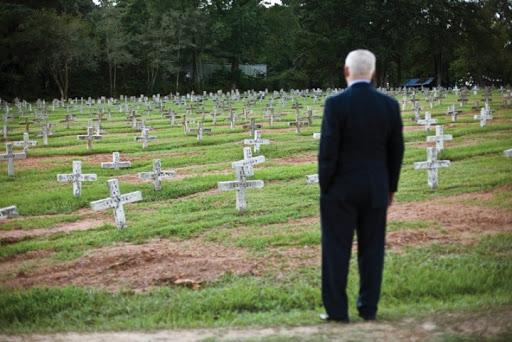
Few political issues reveal the divisions among people who claim to be religious or spiritual more than does the death penalty.
Like Dead Man Walking, the other great death penalty film on this list, At the Death House Door, argues passionately that the death penalty traumatizes those who are called to enact it. Like soldiers drafted into a war that may or may not be for a cause they agree with, guards, wardens, and chaplains bear the toll not only of the events they witness but also of being isolated physically and emotionally from a society that would prefer they not go into too much detail when telling us what happens behind closed doors and the end of darkened corridors.
The soul scars of ministering to ninety-five inmates who were put to death may not be visible on Carroll Pickett’s skin, but they are evident in his voice–a quiet, faltering, mournful voice a little louder than a whisper but still cowed. Listen closely and you might actually hear the rhythms of the condemned men shuffling towards the gurneys on which they were injected, perhaps not actively resisting but pausing as long as possible between each word, each step.
As is appropriate, several films nominated and selected for the 2020 Top 100 list grappled with the ethics and morality of watching. Nowhere is the line between spectator and participant more painfully blurred than in the story of a man whose job it was to ensure that the production elements of an execution went off smoothly. How is he different from the priests at the heart of Scorsese’s Silence who are forced to endure the cries of the suffering? Blade Runner reminds us that there is something holy and painful about watching another consciousness fade into oblivion even if our belief system doesn’t tell us that consciousness is made in the image of the God we profess to serve. How much more painful must it be when that consciousness belongs to a fellow human being, however flawed, however crippled, however guilty.
It is a cliché of both historians and artists that one death is a tragedy, while one hundred thousand deaths is a statistic. Where do ninety-five deaths fall on the spectrum? It is a number small enough to be fathomable but large enough to be horrifying. As each execution passes, Carroll Pickett, standing in for all of us, loses another part of himself. Then it happens again…and again…
— Kenneth R. Morefield
- Directed by: Steve James Peter Gilbert
- Produced by: Peter Gilbert Zak Piper Aaron Wickenden Alison Palmer Bourke Debbie DeMontreux Emily Hart Steve James Christine Lubrano Gordon Quinn Evan Shapiro
- Written by:
- Music by: Leo Sidran
- Cinematography by: Peter Gilbert
- Editing by: Steve James Aaron Wickenden
- Release Date: 2008
- Running Time: 98
- Language: English
Arts & Faith Lists:
2020 Top 100 — #80